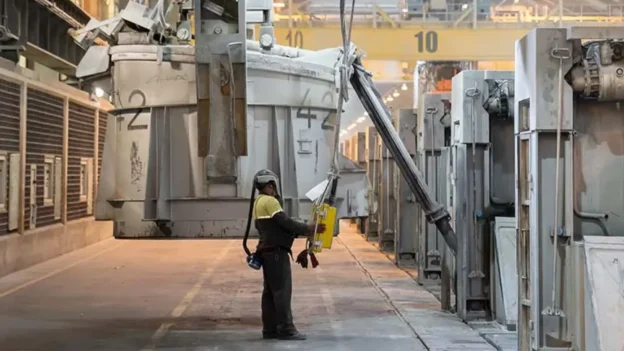With more than four decades of operation, Hillside Aluminium has established itself as the hub of the primary aluminum industry in South Africa. In the province of KwaZulu-Natal, where unemployment exceeds 30%, the smelter is not only keeping its production stable, but also intensifying its commitment to the local economy.
Hillside Aluminum drives industrial growth
The plant, operated by South32, directly employs more than 2,500 people and contributes to nearly 29,000 indirect jobs in the region. Its focus on economic inclusion is reflected in a workforce that is 90% black and has a female participation rate of close to 30%.
Hillside has invested significantly in wages, fiscal contributions and community programs, allocating more than US$22 million to local initiatives in three years. This approach seeks to strengthen South Africa’s industrial capabilities from within.
One of the keys to industrial growth lies in the constant supply of liquid aluminum to domestic manufacturers. Hillside is the only producer of primary aluminum in the country and each year allocates close to 25% of its production to the local market.
Major beneficiaries include Hulamin, the largest manufacturer of aluminum semi-finished products in sub-Saharan Africa, and Bingelela Alloys, an automotive tire alloy company with a majority black female shareholding. Hillside has provided concessional financing to modernize their operations and return leased equipment, fostering their productive independence.
The industrialization drive does not stop there. Hillside is also supporting AluSouth, a firm that plans to reactivate an aluminum rod plant for use in electrical infrastructure. The initiative will help reduce imports, support Eskom’s grid expansion plan and generate jobs.
With an estimated US$20 million for the facility, both state and private financing is in the pipeline. Hillside has committed more than US$4 million to accelerate start-up.
Hillside Aluminum’s model prioritizes the local profitability of aluminum aluminumThe Hillside Aluminium model prioritizes the local benefit of aluminum, focusing on the development of internal capabilities in manufacturing, smelting and transformation. This approach aligns with South Africa’s industrialization goals and contributes to more inclusive economic growth.
Source and photo: South32

